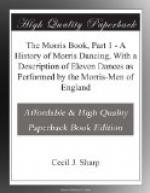“The Abbot.” (Note to chap. 14.) Sir Walter Scott.
“The Fair Maid of Perth.” (Note to chap. 20.) Sir Walter Scott.
“Shakespeare.” (Note to Henry IV., Part I.) Steevens.
“Notes and Queries.”
“Dictionary of Music and Musicians.” Four vols. London, Macmillan and Co., 1879-1899. Edited by Sir George Grove.
“The Transactions of the Folk-Lore Society.” Vol. 8, 1897.
“A Treatise on the art of dancing.” By Giovanni-Andrea Gallini. London, 1792.
“Dancing in all Ages.” London, 1879. Edward Scott.
“A Lytell geste of Robin Hode, &c.” Two vols. London, Longmans, 1847.
MORRIS DANCE TUNES.
There is not much information about Morris tunes to be gathered from books. Chappell, for instance, in his “Popular Music of the Olden Time,” I., pp. 125 and 130, gives but two Morris dance-tunes, “The Staines Morris Tune” and “Trip and Go”; while Mr. Edward Naylor, in the appendix to his “Shakespeare and Music,” only prints the same number—“An English Morris, 1650” (a variant of Chappell’s “Staines Morris Tune"), and an Italian Moresca by Claudio Monteverde, 1608. In Grove’s “Dictionary of Music” (old ed.), II., p. 369, three Morris tunes are recorded: Arbeau’s “Morris Off,” a Yorkshire melody founded on that of “The Literary Dustman,” and a Cheshire Morris to words beginning:—
Morris Dance is a very pretty
tune,
I can dance in my new shoon;
In an interesting and most instructive paper on “Morris-dancing in Oxfordshire,” read by Mr. Percy Manning before the Folk-Lore Society, and printed in their “Transactions” for December, 1897, five tunes are given: “Green Garters,” “Constant Billy,” “Willow Tree,” “Maid of the Mill,” and “Bob and Joan.” Mr. Manning also quotes the names only of the following Morris dances and songs: “Handsome John,” “Highland Mary,” “Green Sleeves,” “Trunk Hose,” “Cockey Brown,” “The Old Road,” “Moll o’ the Whad,” “The Cuckoo,” “The Cuckoo’s Nest,” “White Jock,” and “Hey Morris.” The first three of these, as well as the tunes previously mentioned, were sung or danced by the men of Bampton; the remainder by the Morris men of Field Assarts.
Our own investigations enable us to add very materially to existing knowledge of this branch of the subject. We have noted down between twenty and thirty Morris tunes, and have collected the names of several others, which no doubt we shall eventually acquire as well. The list given below consists almost entirely of tunes which are still in constant use by Morris-men in Gloucestershire, Worcestershire, Oxfordshire, and Derbyshire.
The figures in brackets record the number of times we have collected the same tune, or variants of it, from different Morris sides.




